Is SEO Worth It in 2025? Analyzing the ROI of Organic Search
Editor’s Note: This post was originally published in July of 2023 and has been updated in March 2025 for accuracy and comprehensiveness.
Short answer: Yes. And we’ll show you the reasons why.
But the right question should be, “What type of SEO works in 2025? What does effective SEO look like, and how can it help us achieve results for our business?”
I phrase the question this way because many businesses cut corners with SEO, and cutting corners or hiring shady agencies to build low-quality backlinks never helps.
That’s why if you want an SEO strategy that helps you achieve relevant results for your business, it has to be the right way.
How to Do SEO the Right Way:
This isn’t an exhaustive list of how to improve your SEO and marketing strategy, but these things are key to your marketing activities. Your SEO can fail if you don’t consider them:
1. Start with audience research:
This is the first thing we do in our agency when we sign up a new client. And that’s because we don’t want to guess what users want. We study them.
We want to know who your target users are so that our customer persona is based on real data and we understand their pain points, motivations and search behavior.
2. Speak to subject matter experts:
We interview experts within the company to ensure that the content we create reflects real-world experience, not what’s already online.
This helps us understand your industry so every published content resonates with your audience and is exactly what they need.
3. Leverage proprietary data:
Depending on your business, we help clients run surveys, analyze internal customer data, and use real case studies to share insights no one else has.
For example, our survey on search behavior in the wake of AI helps us know the opportunities in optimizing for AI search.
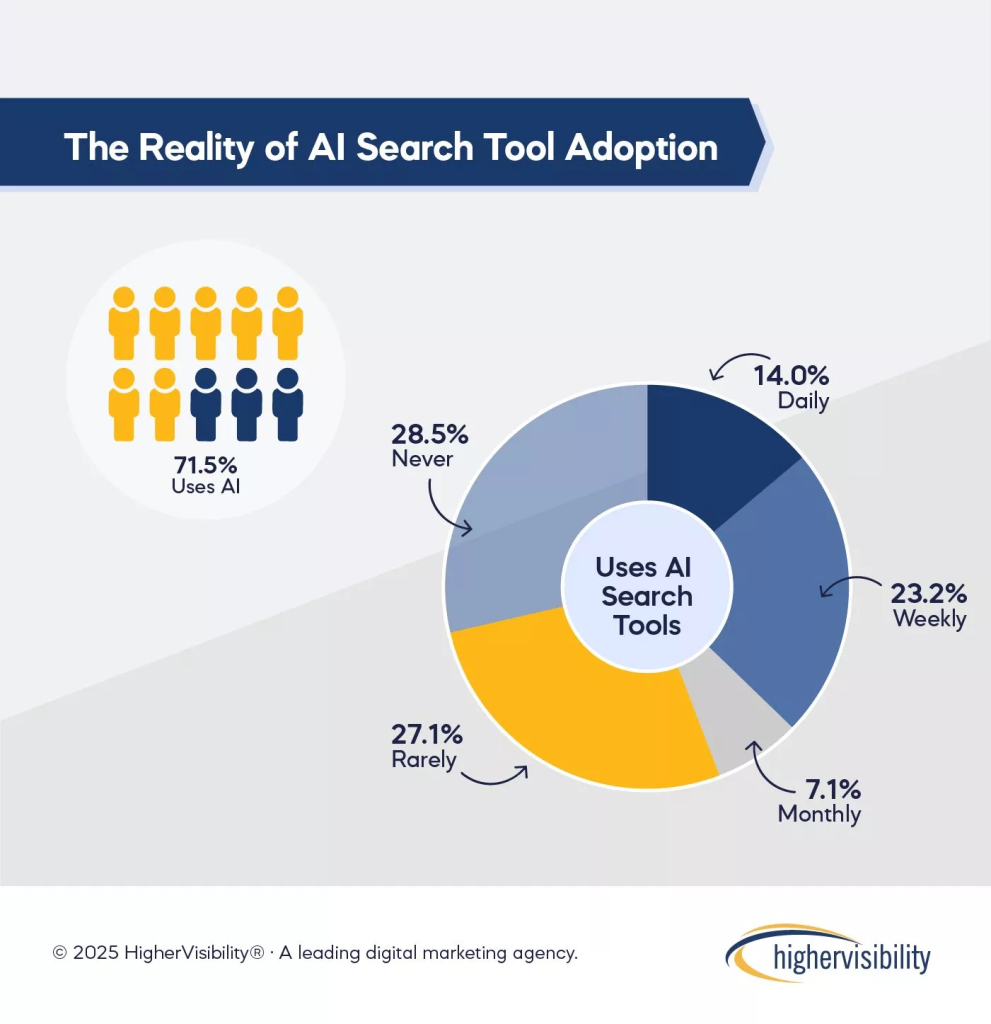
4. We care about developing unique angles:
As said, instead of regurgitating what’s ranking, we identify content gaps where our clients can add something new to the conversation.
In other words, we want to share unique ideas as much as possible so there’s something tangible in our content.
5. Structuring content for engagement:
We already know that a cluttered page can lead to a high bounce rate.
We also recognized that long introductions can lead to a high bounce rate. This means that even if you create great content but it isn’t structured to retain and engage every click, that type of SEO will fail.
So, while working with clients, we incorporate visuals, stories, and reviews (when necessary) to make our content more attractive, engaging, and useful to our audience.
Here’s more detail about what we do in month one with a new client:

So, does this type of SEO work? Yes.
Does SEO Really Work, and How Effective Is It?
Yes, SEO works. It’s a cost-effective marketing channel to generate tons of awareness, traffic, and sales for your business.
But don’t just take our word for it. Here are some stats to back it up:
1. SEO Leads to More Brand Awareness
No other marketing channel can increase brand awareness as SEO, especially if your primary target audience is not chiefly on social media.
Improving your organic search engine rankings lets you reach more prospects than you would with paid marketing.
When you consider the fact that Google processes 96,335 queries every second and ranking on top of SERP in your niche can get you a 39.8% click-through rate (CTR), there’s a lot of opportunity in SEO.
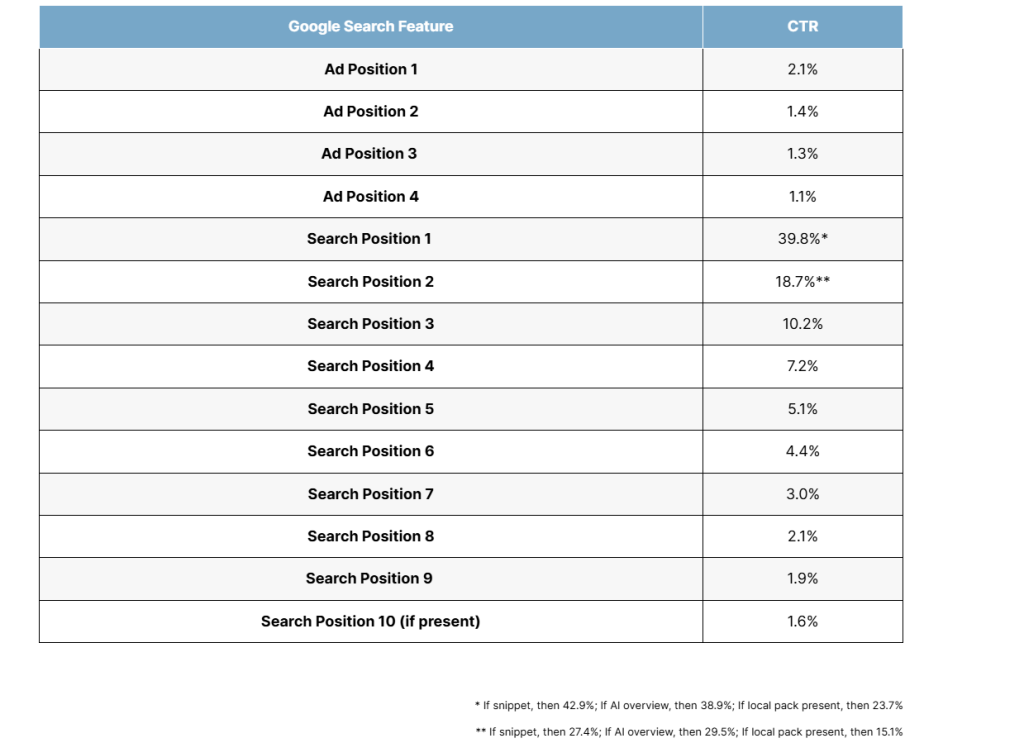
Source: FirstPageSage
39.8% CTR means that 40 out of every 100 people who search for a query you rank number one for click on your website.
And with SEO, the higher you rank, the more your target audience will recognize your brand. And if you publish great content, you’ll be their go-to source for any industry-related information—because they’ll always remember your brand.
2. More Traffic
Google receives around 84.5B billion monthly visits, and roughly 60% of all organic clicks on desktop and mobile go to one of the top three results.
This means you can attract significant traffic to your website when it ranks in the top three of the results pages.
Of course, this is from users who are actively seeking information about your products and services—and it’s free.
3. More Sales
An increase in brand awareness and traffic doesn’t mean anything if you can’t convert it to sales.
That’s why if your SEO will work, it has to be the SEO with content that shows your business (or solution). In other words, your content must attract leads at every stage of the customer journey, including window shoppers and ready-to-buy consumers.
This doesn’t mean you should create content for every stage of the sales funnel (because that might include creating top-of-the-funnel content with informational search intent that has no commercial value).
No. The right strategy is to know what you want to achieve (e.g., more brand awareness, more sales, etc.) and create content that actually helps you achieve this. In most cases, this is usually middle-of-the-funnel and bottom-of-the-funnel content.
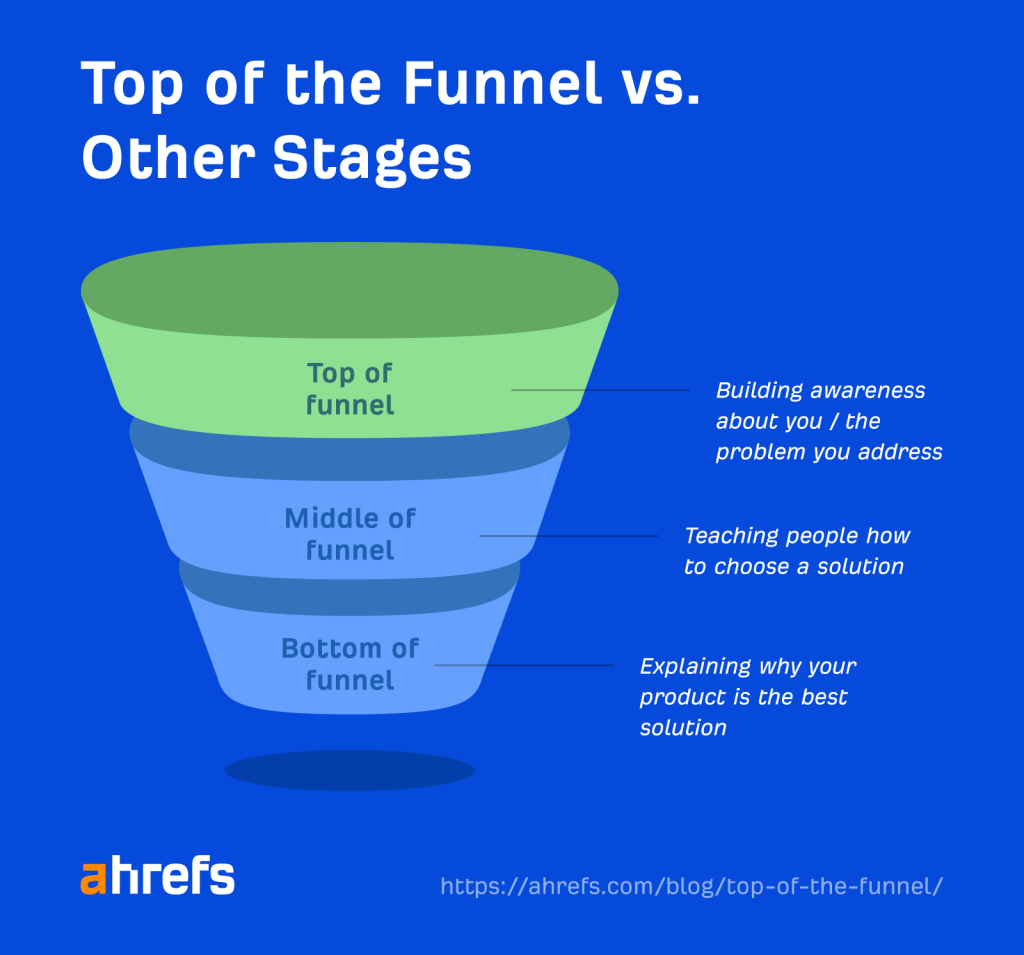
Source: Ahrefs
So, if you want more sales, the content to create is product-led content. Content that shows how your product or service will help your target audience. If done right, your articles will rank on the results page and you’ll also convert high-quality traffic.
Case Studies: Examples of How SEO Helps Businesses
If the stats above haven’t convinced you of the importance of SEO, perhaps a few case studies from our past clients will change your mind:
Case Study #1: The Law Office of Stanton D. Goldberg
The Law Office of Stanton D. Goldberg, despite 30+ years of expertise in tax law and IRS disputes, struggled to reach potential clients through search engines.
The problem:
Their website wasn’t appearing for crucial searches related to tax attorneys and IRS representation in Texas.
What we did:
To help, we started by fixing technical issues that affected the site’s performance, such as slow loading times and mobile display problems.
We researched and targeted specific keywords that potential clients use when searching for tax legal services. We created content that answered common tax law questions to show their expertise.
The results:
A 150% increase in organic traffic year over year, with a 380% jump in the top 3 search rankings.
They moved from position 4 to 2 for key terms like “tax attorney dallas,” and got at least 72 reliable clicks every month. The firm also started ranking for valuable terms like “lottery attorney texas” and “sales tax lawyer.” Overall, their organic traffic value increased by 99%.

Some of the keywords they rank for now.
This transformation shows how strategic SEO can help you win, which is why SEO is worth it in 2025 and beyond.
Case Study #2: Fellow Products
Fellow Products, a San Francisco-based coffee gear manufacturer known for products like the Stagg Pour-Over Kettle, faced fierce competition in search rankings.
The problem:
Despite their premium coffee equipment, they were losing ground to third-party sellers, which directly affected revenue.
What we did:
We developed a multifaceted SEO strategy:
- Revamped their branded search presence and re-optimized their titles and descriptions,
- Improved internal linking for better site navigation, and
- Created a Quality Grader page to demonstrate expertise.
Our team also focused on optimizing product and collection pages while developing targeted content that addressed customer search queries.
The results:
The strategy led to a 108% increase in organic traffic year over year and an 86% boost in organic traffic value. Most importantly, they saw a 28% increase in organic revenue, showing that the additional traffic converted into sales.
The improved site structure and authoritative content also helped them regain visibility— more than third-party competitors.
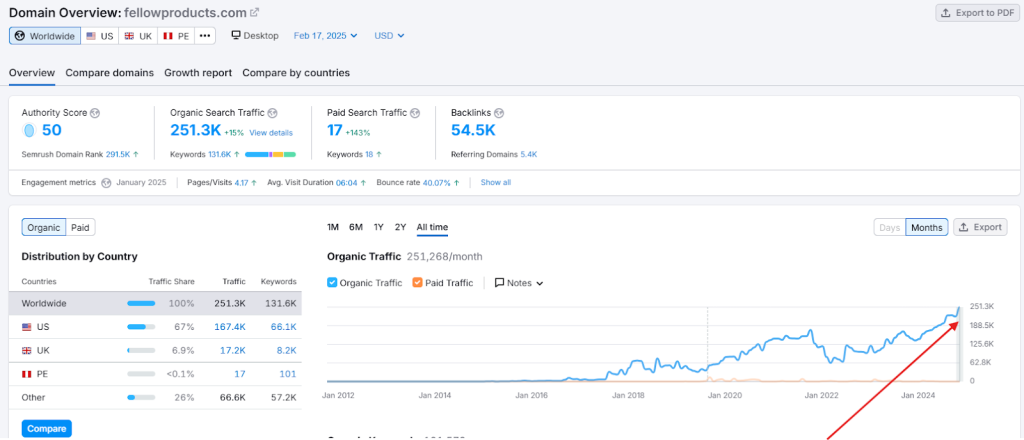
Again, strategic SEO always works. It helped this eCommerce brand increase visibility and revenue, and it can help any other type of business too.
Bottom line? SEO is a solid investment.
Common Questions and Objections About SEO
Here are some objections we’ve heard overtime from those who say blogging is dead or SEO doesn’t work.
Objection #1: SEO Is Too Expensive
Yes, SEO is a bit expensive but the returns are worth it.
According to a 2024 study by Ahrefs, 68.8% of SEO service providers charge a monthly retainer fee of $2,000 or less.
For SEOs that charge per hour, the most common rate is between $75 and $100.
As you’d expect, more experienced SEO providers command higher fees. But SEO pricing also varies widely depending on your specific business needs and objectives.

Source: Ahrefs.
These costs aren’t trivial. And some businesses may be tempted to gamble on a cheaper option when deciding how to allocate their marketing dollars.
We caution against that.
The stats suggest that business owners who spend less than $500 a month on SEO are 75% more likely to be unhappy with their results compared with those who spend $500 or more.
Remember that SEO is like any other service: you get what you pay for.
So, are SEO companies worth it?
Yes, if you go for quality.
Your chances of success are much higher when you work with a reputable SEO provider. If you’re looking for one, learn about our SEO services and how we can help you. And if you’re wondering if we’ll be the best partner, here are some of the things past clients have said about us.
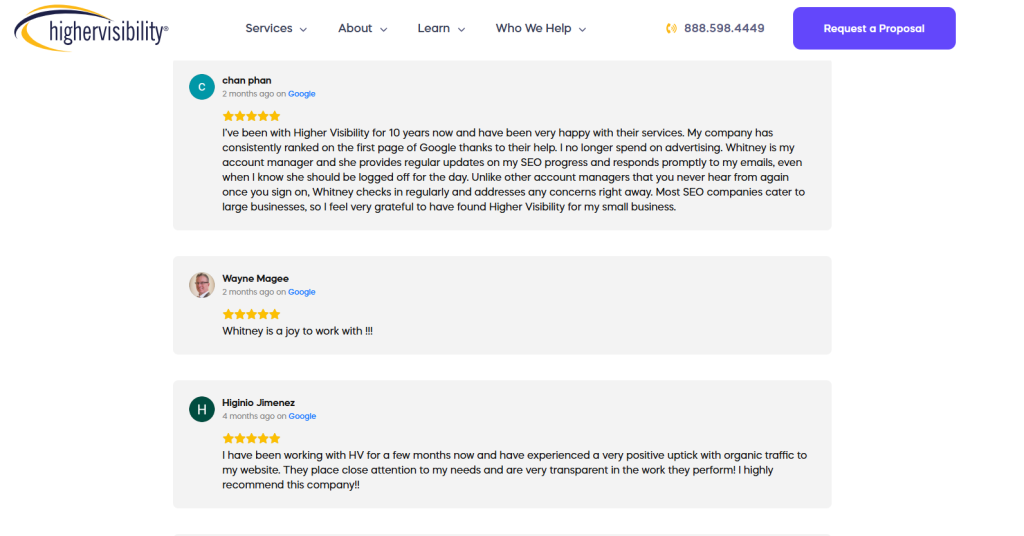
Objection #2: SEO Results Take Too Long
Our study on small business digital marketing shows that 68.8% of SMB owners expect significant SEO results within three months or less.

The reality is that even with a big budget and the support of professional SEOs, you’re unlikely to see many significant results within three months.
However, after six to eight months of a well-crafted SEO strategy, you’ll start noticing improvements in keyword rankings and traffic volumes.
And as you keep your foot on the pedal, you can expect this progress to continue until you reach a point where you’ve completely transformed your organic search performance for the better.
Keep in mind that the average page ranking on page one of Google is over two years old. So, yes, SEO takes time. But that just means that having a little patience gives you a significant competitive advantage.
Objection #3: SEO Is Dead Because of AI
The recent rise of AI search (like ChatGPT, Perplexity AI, Google AI Overviews, Gemini) has led some to predict that SEO will soon become obsolete. The idea is that as AI becomes better at understanding and generating human-like content, search engines will no longer be required.
Why?
Because if AI reliably gives direct, high-quality answers to questions, there won’t be a need to visit websites. And, therefore, no need to use search engines.
We think this is misguided.
First, AI creates answers based on existing information; it doesn’t come up with new insights of its own.
Second, the search engines do more than just provide answers to questions. They connect users to an ecosystem of digital resources.
Think online communities, interactive content, products, services and rich multimedia experiences. AI, in its current form, doesn’t come close to offering the same thing.
Finally, the relationship between AI and search engines is actually more cooperative than competitive. Search engines are adopting AI to improve the convenience and accuracy of their services.
For example, users can now get AI-generated answers alongside traditional search results. Here’s an example from AI Overviews:
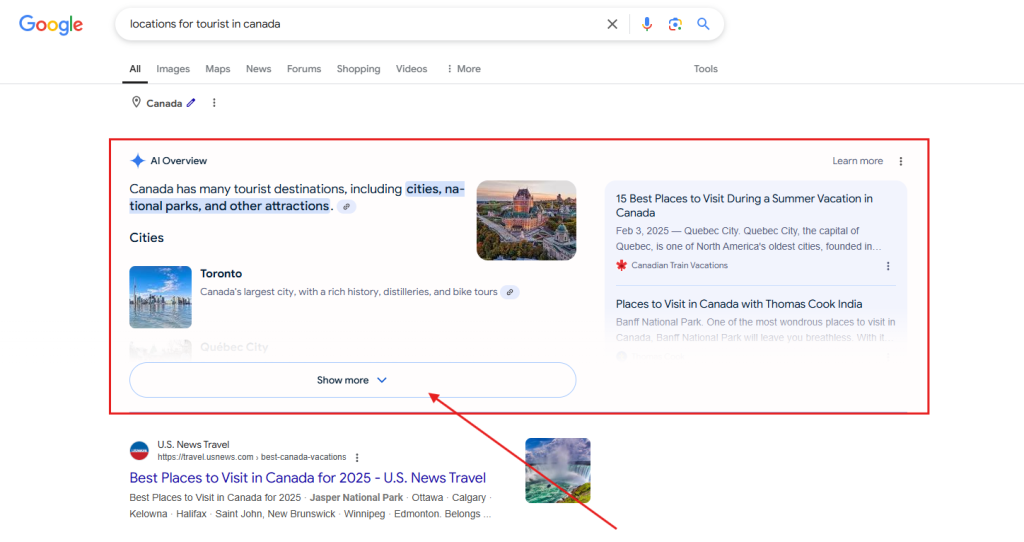
So, No, SEO isn’t dead because of AI. It’s probably better.
Objection #4: SEO Doesn’t Work for My Industry
Some business owners believe that SEO doesn’t apply to their business category.
But the reality is that any business can benefit from SEO in some capacity.
If either of the following is true, SEO can work for you:
- Your potential customers use search engines to find the type of product or service you sell.
- Your potential customers use search engines to find solutions to the kind of problems your business solves.
- Your competitors have an online presence and appear in search results.
Objection #5: SEO Is Too Competitive
The concern that SEO is too competitive is understandable.
After all, there are limited spaces at the top of the search results. And these spaces tend to be dominated by well-established brands.
There’s intense competition for a small business starting from scratch, but this pessimism is misplaced.
Search engine algorithms are designed to prioritize relevant and quality results. This means even new or small websites can outrank bigger sites if they focus on creating highly relevant, valuable content.
Also, SEO isn’t just about ranking for the most competitive keywords. There are countless niche keywords and long-tail phrases that are far less competitive but highly targeted toward specific user intents.
By focusing on these terms, you can attract qualified traffic without having to compete with industry giants.
Lastly, as much as 46% of all search queries have local intent. This is great news for small businesses. Optimizing for local search queries helps you capture traffic from potential customers in your area while facing less competition from national or global brands.
Objection #6: I Want to Do SEO Myself. But I Can’t Find Quality Advice
If you don’t have the budget to outsource your SEO, be careful who you take DIY SEO advice from.
There’s a lot of information about SEO:

But not all of this is good information. A lot of these results contain outdated advice or even stuff that never really worked.
So, which sources should you seek for SEO advice?
First and foremost, we recommend Google’s own guidelines. Also, any SEO software companies with access to search engine data, respected industry publications, and experts with a proven track record. Take advice from:
- The big three SEO software providers: Moz, SEMrush, Ahrefs.
- Reputable industry publications: Search Engine Land, Search Engine Journal, Search Engine Watch, Backlinko.
- SEO agencies or consultants with a proven track record: HigherVisibility, etc.
As a rule, if you follow the latest guidelines and research-backed advice, you’ll be heading in the right direction.
Objection #7: SEO Seems Like Too Much to Manage
SEO can seem like a complex business to newcomers. And it’s true that SEO requires familiarity with several sub-disciplines, such as:
- Web design.
- User experience.
- Mobile optimization.
- Keyword research.
- Content creation.
- Technical SEO.
- Local SEO.
- Link building.
- Digital PR.
- Conversion copywriting.
- Analytics and reporting.
- Overall strategy.
That’s a lot to manage on your own. So it’s no surprise so many small businesses decide to outsource SEO to the experts.
But if you’re still on the fence about hiring an agency to manage your SEO program, know that you won’t need to pay a hefty upfront fee to fix everything wrong with your site all at once.
Quality agencies like ours know that SEO is a never-ending process that requires long-term investment. We’ll be happy to help you identify which problems to prioritize first and create a plan for ongoing optimization.
The Verdict: Is SEO Still Worth it in 2025?
Yes. As the stats have shown, SEO is an excellent way to increase brand awareness, traffic, and sales revenue.
That said, SEO is only worth it if you approach it the right way. To succeed, you should invest in the support of a reputable SEO agency (if you have the budget) and prepare to wait several months before your efforts start to bear fruit.
